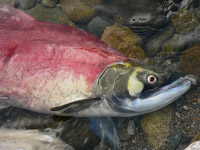
| Ottawa Regulation: Kill Wild Fish Save Farms | 31 October 14 |

The proposed regulation would have re-assigned a DFO regulatory priority, the conservation and protection of the wild fishery to another agency, the Canadian Food Inspection Agency, by allowing the President to decide to authorize deposit of deleterious substances outside aquaculture facilities. This will kill wild fish. The open-pen net aquaculture salmon industry profits from use of a common resource, the ocean, without having to compensate for impacts, including disease and parasite outbreaks, pollution of ocean floor, displacement and killing of other creatures and loss of livelihoods dependent on healthy wild populations environment. Farmed salmon are also fed wild fish, ground up and compressed into food pellets. However, these pellets are soaked with fish oil causing farmed salmon to be much fatter than wild salmon. You can recognize farmed salmon by the solid white bars of fat that streak through the flesh of farmed salmon. Many toxins bind to fat, so the more fat in a product the greater the potential for bioaccumulated toxins.
View October 22, 2014 Conservation Council of New Brunswick article |
|
 Print version Print version |
Top |
